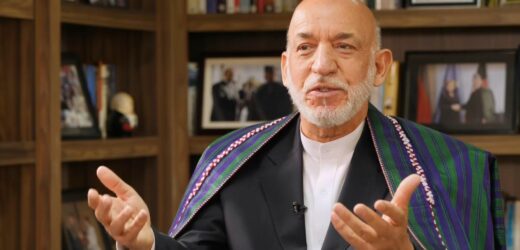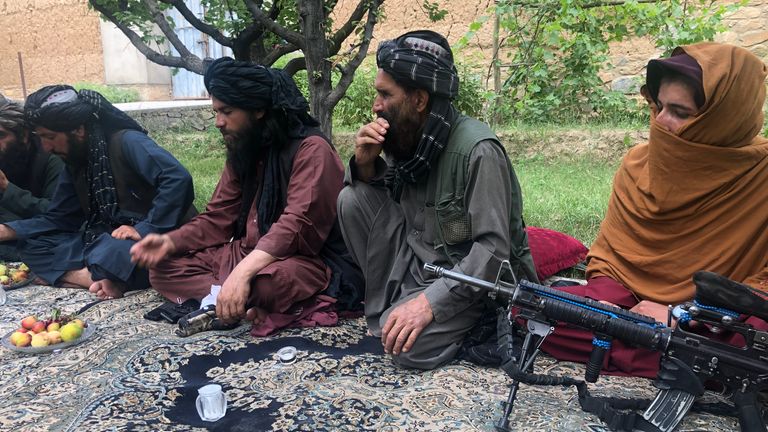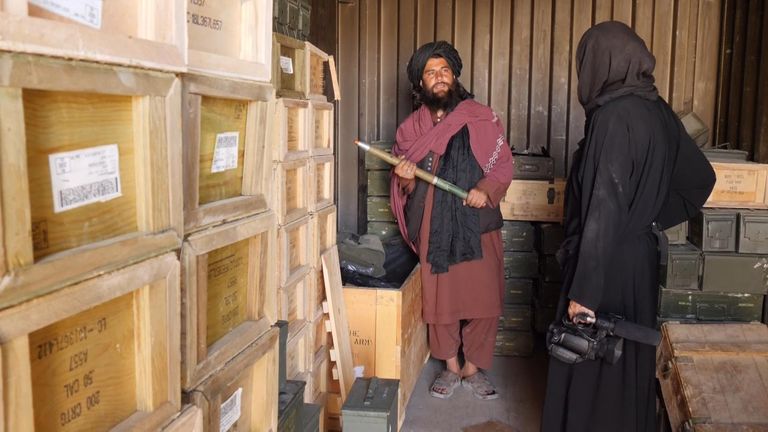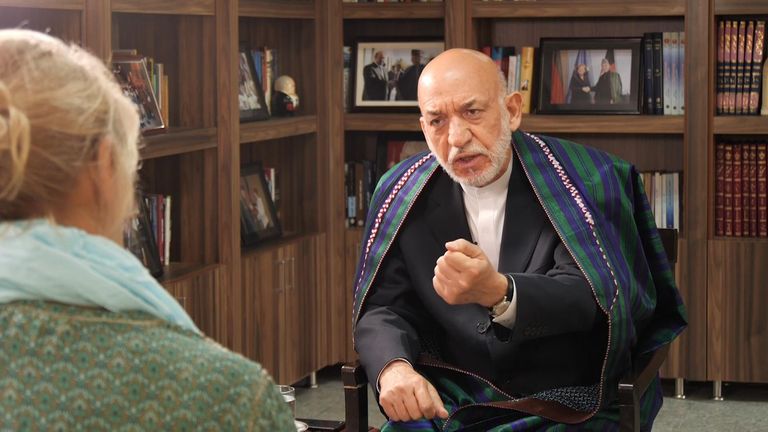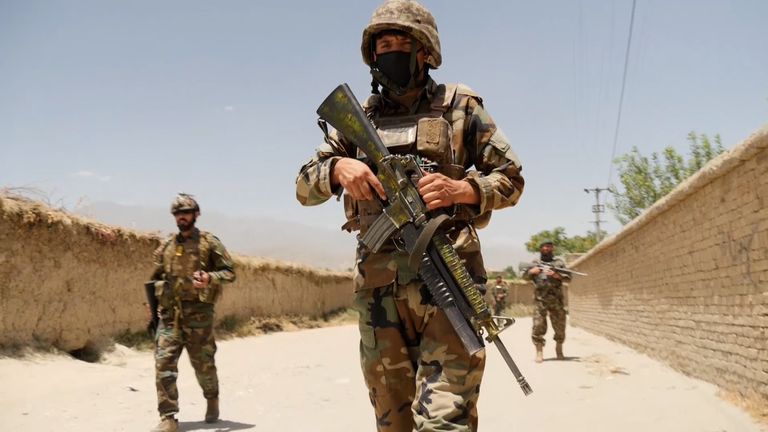A stream of politicians, ambassadors, world leaders and business people file in and out of former Afghan president Hamid Karzai’s home in Kabul.
The views and guidance of the charismatic, first popularly-elected leader of Afghanistan are still much sought after.
And right now, he is one of the most vocal critics of the American policy and US approach in his homeland, alongside the hasty exit of international troops after nearly two decades.
He is standing talking to his advisers when I spot him in the garden of his heavily-protected home, which is surrounded by concrete blast walls and has several layers of security.
The Sky News team is busy setting up for our interview with him in his library but I can’t resist shouting a cheery “hello” through the window to him.
He was the dominant political leader when I was Asia correspondent based in Delhi around the start of the US-led coalition invasion and I attended his numerous media conferences whilst covering the ongoing turmoil in Afghanistan.
He gallantly responds, bending slightly in a bow and calling me “mam” and obligingly saying he’ll come in as soon as we are ready for him.
His library is packed with photographs of him with every recent world leader you can think of from America’s George Bush to Russia’s Vladimir Putin to China’s Hu Jintao, Turkey’s Recep Erdogan and the UK’s David Cameron.
He became leader of his country the same year the international troops toppled the Taliban from power in 2001.
His smooth, educated charm appealed to the West then.
Amongst the books jostling for position on his shelves are The Hobbit, the works of Nietzsche, the Constitution of India and Nelson Mandela’s Long Walk to Freedom, and in pride of place as you enter the room is a framed copy of the honorary knighthood he received from the Queen in 2003 as a “token of our friendship”.
When he enters the room for our interview he’s all smiles and oozing friendliness, apologising for keeping his distance because of coronavirus.
But underneath this urbane exterior his wily political skills are still operating. He knows what he wants to say and who he wants to say it to.
He’s angry and condemnatory about America’s tactics in his country, “although there are some good people” he says he’s worked with over the years, but he doesn’t pull his punches about their role in the continued insecurity and terrorism in his country either.
Freed from the shackles of being an elected politician, he can more easily dole out his jabs and upper cuts than those still having to tread carefully through diplomatic minefields.
“The entire international community backed the presence of the United States and NATO in Afghanistan in the name of the fight against terrorism,” he tells Sky News.
“But it was during their presence here under their watch that ISIS emerged in Afghanistan.
“In terms of the main US and allies objective in which the Afghan people should join hands and there should be an end to extremism, bring stability in Afghanistan and peace in our country, no. It has been disastrous for us.”
The former president is firmly of the view that the presence of American troops has contributed to the growth of terrorism in Afghanistan – and unlike many other Afghans, the international troops have been making the situation worse not better for the people of the country.
“If Daesh emerged in Afghanistan of its own means and out of its own ideology, for whatever reason,” he continues.
“And that’s happened during the presence of the United States and the Western allies in NATO IN Afghanistan, then this mission has failed. So, they [had] better end this failed mission.
“If the Afghans keep suffering because of insecurity and lawlessness and attacks and conflict during the presence of these forces in Afghanistan who are here in the name of security and stability in Afghanistan, then they have failed.
“Then, it is for the Afghans to find ways of our own. We must find our way with Pakistan. We must find a way with good neighbours. We must find our way within our own society.”
He’s disappointed with the outcome of the Washington meeting between President Ashraf Ghani and the US leader, President Joe Biden, saying “they should have talked peace not about how many helicopters they’re going to provide”.
He’s full of anecdotes which are crammed full of insight and minute detail and recounts a night spent in Washington with politicians in the early 2000s during which they were trying to persuade him to set up more jails to allow them to take more prisoners.
He vigorously opposed that, as well as demanding the closure of the Bagram prison in the military base set up on the outskirts of Kabul which became synonymous with torture and terror.
The former president recounts the conversation he had then with the Republican senator Lindsey Graham: “I said, ‘why? Why should you be creating more prisons in Afghanistan? You shouldn’t have any presence in Afghanistan. And we will not allow you. And if this is how you do things, the Afghans will treat you like they treated the Soviet Union’. And then he looked at me and said, ‘you are one man, how can you stop us’?”
Mr Karzai is aghast at remembering the disrespect shown to him and his country. “You are one man. How can you stop us?” he repeats to us.
“He was addressing someone who, in their own words, was the elected president of a country, as just one man.”
It was this total disregard for the wishes of the people of Afghanistan which the former leader believes ultimately led to the mission failure.
A few days later, the former president invites me back to “chat and have a coffee” with him. His schedule is hectic judging by the constant stream of pictures in the Afghanistan Times showing him meeting the Pakistan ambassador, the Iranian special envoy, the newly-appointed British ambassador, and the former Afghan vice-president Ahmad Zia Massoud, amongst others.
He introduces me to the American delegation who are just leaving and they seem red-faced and flustered and I wonder if they’ve seen the other side of the engagingly pleasant Mr Karzai, the one who resisted all American pressure to sign the bilateral security agreement because he did not agree with the continued raids on Afghan villages by US troops.
His office said then in 2014: “This agreement must reflect and mean peace to the people of Afghanistan and whenever the Afghan people are convinced that their wish will be met, the agreement will certainly be signed.”
He maintains the Taliban need to be part of a future Afghan government but they need to renounce violence.
And he’s virulently against a national mobilisation of armed groups to resist a Taliban takeover. There’s a picture of him alongside the former head of the Northern Alliance, Ahmad Shah Massoud, who was assassinated two days before 9/11.
His son Ahmad Massoud is now rallying armed groups to do just that in order “to preserve the democratic improvements we cherish”.
“We should not be fighting the Taliban,” the former president says. “This is a foreign conflict. This is a conflict for the interests of foreign powers, not for Afghanistan.
“Any Afghan that takes a gun against another Afghan is doing it for a foreign objective, not in Afghan objectives. So, they are wrong to be fighting the Taliban. They are terribly, terribly wrong to be doing this and to be causing this hurt to the Afghan people.”
And he insists he has no wish to return to power but his life mission is to continue working for peace in Afghanistan.
“You didn’t ask me about the British involvement,” he admonishes me, at the end of our interview as his aide is repeatedly tapping his watch in my direction out of camera sight.
(I’d been told before it began: “The interview will begin at 10.30 and end half an hour later”, in a way which left no room for doubt.) And he uses it to again criticise the US tactics versus the British approach.
“The British have begun recently a very worthy exercise of trying to improve relations between Afghanistan and Pakistan,” he says. “And working for peace in Afghanistan. This is something that I’ve noticed and I’ve been engaged in for the last month and a half.
“I wish them success and I also wish success for peace in Afghanistan to the US – and they must come and prove themselves. So, the British exercise is good and we will be with them if they move forward in bringing a genuinely better relationship between us and Pakistan, a civilised relationship.
“A relationship based on a civilised living together, on civility and for peace.’
He insists he’s finished with public office, “I’ve done my time mam,” he says, “I’m the architect of this constitution. I created a democratic constitution for Afghanistan, I conducted elections, and on my terms ended, I handed over to a successor government to a democratic procedure. And I will not do anything to affect that legacy.”
Judging by the line of politicians beating a path to his door, the former leader still wields considerable influence both at home and abroad.
Source: Read Full Article
